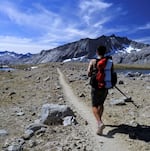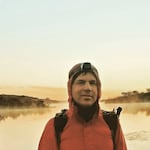
Rue McKenrick in the Sierra Nevada of California, about 1,000 miles into the 12,000 mile American Perimeter Trail.
courtesy of Rue McKenrick
One day in July 2019, Rue McKenrick left his home in Bend and started walking.
He kept going for about 15 months.
McKenrick is a professional backpacker and had already through-hiked the 2,190 mile Appalachian Trail, the 2,650 mile Pacific Crest Trail and the 3,100 mile Continental Divide Trail. Now he’s working to create a new hiking trail to connect the contiguous United States.
According to McKenrick, the American Perimeter Trail will be more than 14,000 miles long once developed. He set out to hike the whole thing and made it about 10,000 miles before weather conditions and health problems forced him to come back to Bend. He was diagnosed with overtraining syndrome in October of last year and spent a few months recuperating. He’s heading back to North Dakota to pick up where he left off and hike the remainder of the trail he hopes will be nationally recognized one day.
“What you see now currently on our map is the first scouting mission,” McKenrick told OPB’s Think Out Loud. “The trail is very much an organism that changes and grows and adapts as time goes on.”

Backpacker Rue McKenrick is hiking the proposed route for a new hiking trail called the American Perimeter Trail that would circle the continental United States.
courtesy of Rue McKer
McKenrick is quick to point out that he doesn’t expect most people will want to hike the entire American Perimeter Trail. He imagines many different uses for the trail, from day hikes to longer backpacking trips and even picnics or people just taking a selfie with the trailhead sign. He says he’s most focused on promoting conservation.
“One way to conserve land is to open it for recreational use,” he said. “And we find that with fishing or with hunting or with biking and that when people are able to participate and enjoy this place, they take care of it and they care for it.”
When he set out to hike thousands and thousands of miles, McKenrick didn’t account for a global pandemic. He says he first realized how dire things were after he crossed the Mississippi River in mid-March of 2020.
“I walked into a tourist town that was supposed to have been having a festival that brings thousands of people from all around the world. And I walked into this place and there was no one anywhere. There were no cars, there were no people,” he said. “[I] realized that the entire town was shut down and that something had quickly changed in the last probably three or four days.”
He says he considered cutting his trip short at that point, but he felt a sense of responsibility to sponsors and individual contributors who were funding his trek. He did adjust his route to ensure he wouldn’t encounter other people on established hikes, such as the Appalachian Trail.
With so many businesses shuttered, he became almost completely dependent on mailed packages for food and other supplies. He had to go without laundry facilities or the ability to charge his devices.
“I didn’t have hot meals ... It kind of took the regular kind of isolated backpacking and bumped it up to the next level,” he said. “One time I lost my toothbrush, and I got to my box and there was no toothbrush in it. So I just didn’t brush my teeth that week.”

Rue McKenrick set out to create a new hiking trail connecting the continental United States. He's on a mission to hike all 14,000 miles to promote what he hopes will become a nationally recognized trail.
courtesy of Rue McKenrick
In addition to the extreme isolation brought on by the pandemic, he endured an intestinal infection, a tree falling on his hammock and a swarm of biting ants that caused his face to swell so much he could only see out of one eye.
Asked what kept him going through all of that, McKenrick said it was the vision he’d had, years ago, to create the American Perimeter Trail and the commitment he made after wrestling with it for a long time: “I will give it everything that I have. I mean every single bit of my life force.”
There came a point when it seemed like the trail might take McKenrick’s life. He pushed his body too far by walking 20 or 30 miles every day, even when what turned out to be overtraining syndrome started to impact his ability to eat or keep food down. At one point, he said he was only able to consume about 100 calories per day.
“This was kind of a spiritual journey,” he said. “So at times where I was isolated and I couldn’t reach out for others for comfort, I sought to tap into the energy source of the earth and also the energy source of the people that I would meet. Some may call that love.”
After recuperating at home in Bend, and consulting with a team of doctors, McKenrick is headed back to North Dakota to finish what he started.
“I feel like at this point in time, it’s a new day, it’s a new earth with all of the beauties and horrors that we have encountered in this past year.” he said. “And I wanted to do something positive here in the world.”
Contact “Think Out Loud®”
If you’d like to comment on any of the topics in this show or suggest a topic of your own, please get in touch with us on Facebook or Twitter, send an email to thinkoutloud@opb.org, or you can leave a voicemail for us at 503-293-1983. The call-in phone number during the noon hour is 888-665-5865.